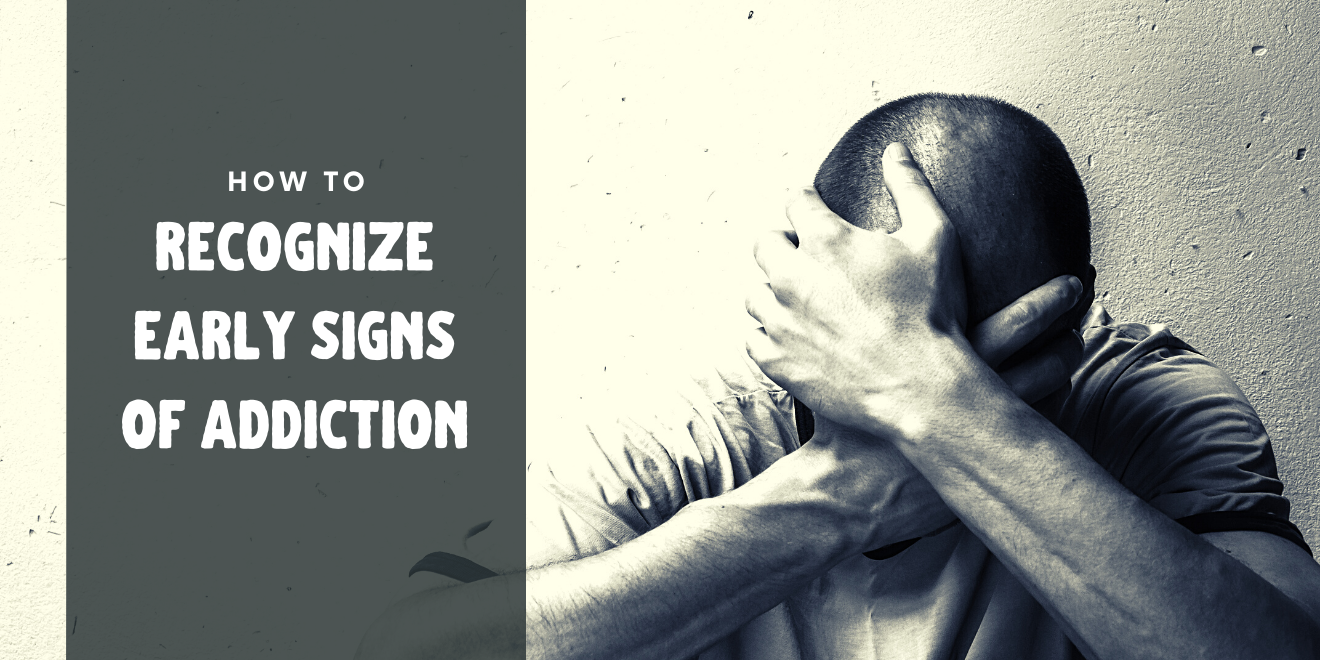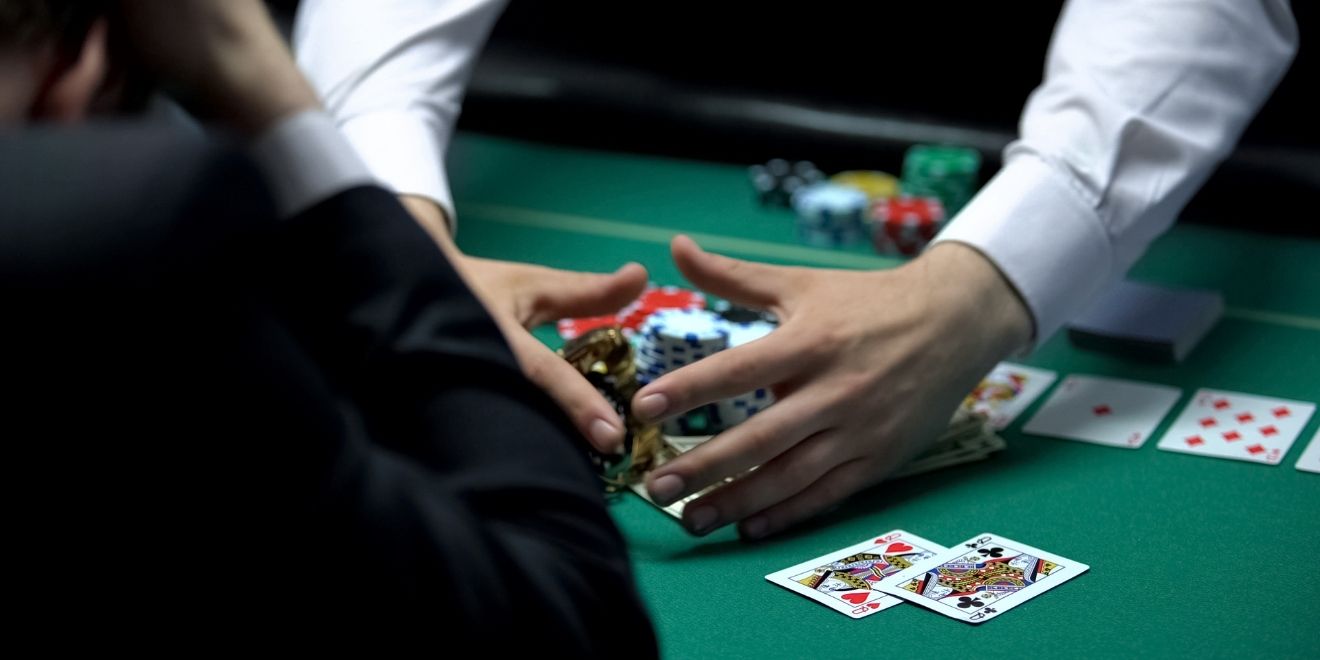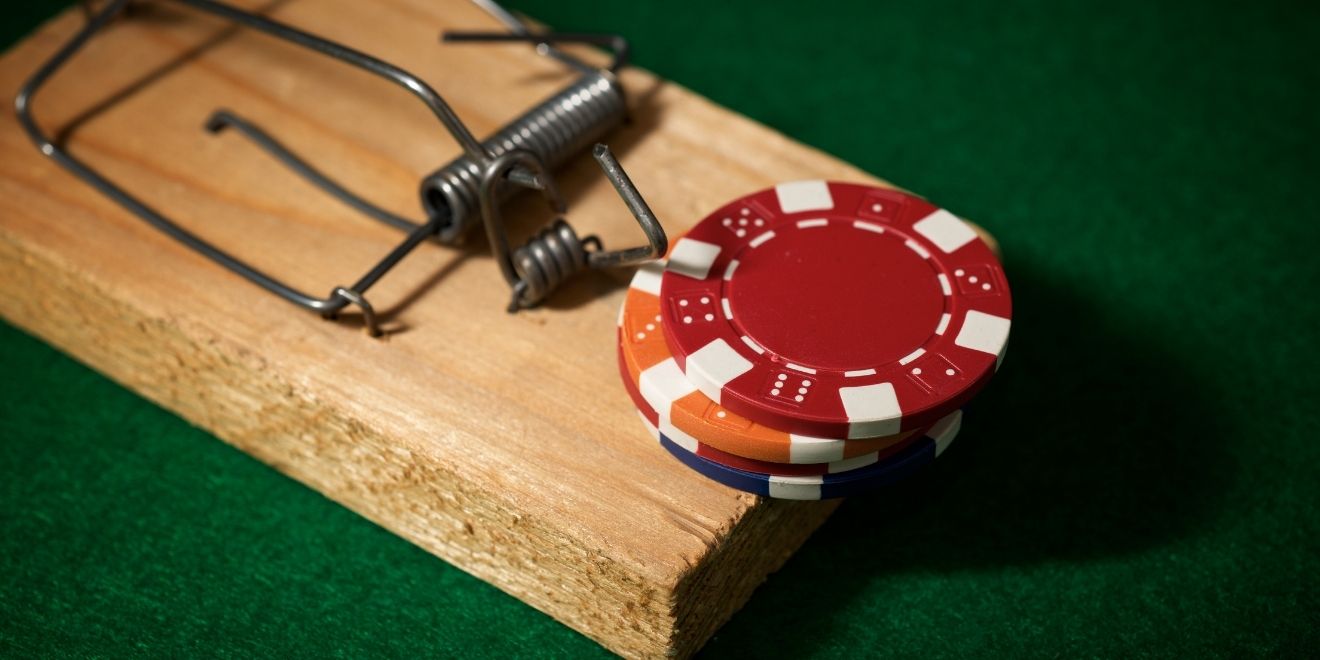How to Recognize Early Signs of Addiction

Are you concerned that someone you know might have a gambling problem but don't know what to look for?
If so, you've come to the right place.
Knowing the warning signs is essential in this situation, as it helps you decide if any action is needed. Lucky for you, we broke down the early signs of addiction, so you know what to pay attention to. Scroll down to learn more.
Problem gambling is a behavioral addiction where a person has a pathological compulsion to bet. What begins as some fun casino action eventually turns destructive, but the gambler continues regardless of the negative consequences and impact on their life.

Gambling statistics show that between three and five of every one hundred gamblers deal with problem gambling.
Like with most other addictions, compulsive gambling is a direct product of underlying issues in the addict's life. These can range anywhere from stress at work and unresolved relationship issues to undiagnosed mental issues or other addictions. Factors like desperation for money, the entertainment from gambling, and the social status of being a successful gambler also play a role.
It's important to note that there are various kinds of gambling addiction. Problem gambling doesn't entail being addicted just to slot machines and card games. It can manifest in constant purchasing lottery tickets, making frequent bets with friends, etc.
So, they keep wagering what's left of their money to score big, which only traps them further in the cycle. Alternatively, some gamblers get addicted to the adrenaline rush and emotional high that comes with risky bets.
So, we must ask ourselves what the symptoms of gambling addiction are.

Though they can vary depending on the gambler, there are still several signs that can be used to recognize problem gambling.
For instance, the most common physical signs of gambling addiction include headaches, sleeping problems, weight gain or loss, and dark eye circles. On the other hand, psychological symptoms can manifest as depression, distress, and anxiety.
The difference between a casual punter and a problem gambler is that the first one might spend some extra cash on wagering as a fun activity. But, as soon as their losses go beyond their budget, they stop. Pathological gambling, however, robs consumers of the ability to control or stop gambling when they lose more money than they can afford.
Sadly, it often doesn't end with just losing cash. The problem gambler might also risk personal assets like their vehicle, home, or other properties. That’s why having a bankroll management strategy and sticking to it is essential.
After spending more than they can afford on gambling, the gambler will need instant cash to fund their habit. They're desperate to continue gambling and will go to any length to get money while being convinced their luck will turn and they'll hit the jackpot.
So, their first option is borrowing money from friends or family. If that isn't possible, they'll resort to lines of credit, mortgages, or bank loans. Yet, it doesn't end there. Once the punter exhausts those options, they might even turn to high-interest loans like credit cards, payday advances, and even loan sharks.
Also known as chasing, this symptom of gambling addiction manifests when the gambler is convinced that they can win back their lost money. Simply put, they use the "one more bet" philosophy that makes them delusional enough to believe that the next bet is a guaranteed win. As a result, they fall even deeper into financial ruin and worsen their state.

Casino games are games of luck and no matter how many times you’ve lost, that doesn’t mean that you will eventually win. Problem gamblers rarely accept this fact and continue to hope that their luck would change for the better.
Lying to cover an addiction is a core symptom of every addiction, including problem gambling. In this case, the compulsion to gamble is so powerful that the addict will go to any length to continue wagering. This entails lying about where they are, what they're doing, what happened to their money.
Yet, the lies go even further than that. Often, problem gamblers lie to themselves. They do this by rationalizing and excusing their behavior and the consequences that come from it. Even though the reasons they use are false and often don't make any sense, they don't stop. The reason behind this is simple. Creating these excuses and justifying their behavior reduces the psychological discomfort they feel.
While lying to yourself about your addiction may work, your family and friends will eventually start suspecting things. If the loved ones express concern to the problem gambler, they deny the problem and deflect.

Usually, this will make the problem even more apparent to the family, and they become even more insistent. This will result in frustration on both sides. Firstly, family and friends simply won't be able to understand why the gambler can't "just stop" wagering. From the punter's point of view, however, the concern is perceived as nagging. As a result, the gambler will often push friends and family away and isolate themselves from their community.
Just like other forms of addiction, problem gambling is an unhealthy coping mechanism. It's often used as a way for gamblers to distract themselves from life's problems and mask negative emotions. Yet, it's a double-edged sword. Though gambling helps you avoid undesirable emotions, it eventually has its own effects that negatively impact your mental health.
The science behind this is quite simple. When you're gambling, your brain releases neurotransmitters that make you feel good. This, in turn, provides relief from the negative emotions and stress. The problem arises when addicts aren't gambling, and the reward system is damaged.
The brain stops releasing all the "feel-good" chemicals to even out the amount it produced from gambling. Hence, the brain's chemical balance ends up highly dysregulated and dysfunctional. As a direct result, the problem gambler feels unhappy, irritable, and low.

At the end of the day, gambling addiction is defined as the inability to control or stop harmful behavior.
As much as they try to quit the vice, problem gamblers will always find themselves going back to gambling. This, of course, can be solved with the proper therapy and resources.
If you cancel other plans so you can gamble and you can’t say when it’s enough, you should start working on your problem. But to successfully recover, the gambler must face the underlying issues that cause the addiction in the first place.
These are the most common early signs of gambling addiction. If you have any of these symptoms or know someone these apply to, make sure not to ignore them.
Reacting as soon as possible will minimize the impact of the addiction and prevent it from ruining someone's life.
While we hope nobody will have to deal with this, we also hope that this article will help when you need it the most.
Knowing the warning signs is essential in this situation, as it helps you decide if any action is needed. Lucky for you, we broke down the early signs of addiction, so you know what to pay attention to. Scroll down to learn more.
What Is Gambling Addiction?
Problem gambling is a behavioral addiction where a person has a pathological compulsion to bet. What begins as some fun casino action eventually turns destructive, but the gambler continues regardless of the negative consequences and impact on their life.

Gambling statistics show that between three and five of every one hundred gamblers deal with problem gambling.
Like with most other addictions, compulsive gambling is a direct product of underlying issues in the addict's life. These can range anywhere from stress at work and unresolved relationship issues to undiagnosed mental issues or other addictions. Factors like desperation for money, the entertainment from gambling, and the social status of being a successful gambler also play a role.
It's important to note that there are various kinds of gambling addiction. Problem gambling doesn't entail being addicted just to slot machines and card games. It can manifest in constant purchasing lottery tickets, making frequent bets with friends, etc.
One type of gambling addiction is when the person deals with huge financial problems from wagering yet still thinks gambling is the only way out.
So, they keep wagering what's left of their money to score big, which only traps them further in the cycle. Alternatively, some gamblers get addicted to the adrenaline rush and emotional high that comes with risky bets.
Symptoms of Problem Gambling
So, we must ask ourselves what the symptoms of gambling addiction are.

Though they can vary depending on the gambler, there are still several signs that can be used to recognize problem gambling.
For instance, the most common physical signs of gambling addiction include headaches, sleeping problems, weight gain or loss, and dark eye circles. On the other hand, psychological symptoms can manifest as depression, distress, and anxiety.
You Gamble Beyond Your Means
The difference between a casual punter and a problem gambler is that the first one might spend some extra cash on wagering as a fun activity. But, as soon as their losses go beyond their budget, they stop. Pathological gambling, however, robs consumers of the ability to control or stop gambling when they lose more money than they can afford.
Sadly, it often doesn't end with just losing cash. The problem gambler might also risk personal assets like their vehicle, home, or other properties. That’s why having a bankroll management strategy and sticking to it is essential.
You Borrow Money to Fund Gambling
After spending more than they can afford on gambling, the gambler will need instant cash to fund their habit. They're desperate to continue gambling and will go to any length to get money while being convinced their luck will turn and they'll hit the jackpot.
So, their first option is borrowing money from friends or family. If that isn't possible, they'll resort to lines of credit, mortgages, or bank loans. Yet, it doesn't end there. Once the punter exhausts those options, they might even turn to high-interest loans like credit cards, payday advances, and even loan sharks.
You Try to Recover Losses by Gambling
Also known as chasing, this symptom of gambling addiction manifests when the gambler is convinced that they can win back their lost money. Simply put, they use the "one more bet" philosophy that makes them delusional enough to believe that the next bet is a guaranteed win. As a result, they fall even deeper into financial ruin and worsen their state.

Casino games are games of luck and no matter how many times you’ve lost, that doesn’t mean that you will eventually win. Problem gamblers rarely accept this fact and continue to hope that their luck would change for the better.
You Lie About Your Gambling
Lying to cover an addiction is a core symptom of every addiction, including problem gambling. In this case, the compulsion to gamble is so powerful that the addict will go to any length to continue wagering. This entails lying about where they are, what they're doing, what happened to their money.
Yet, the lies go even further than that. Often, problem gamblers lie to themselves. They do this by rationalizing and excusing their behavior and the consequences that come from it. Even though the reasons they use are false and often don't make any sense, they don't stop. The reason behind this is simple. Creating these excuses and justifying their behavior reduces the psychological discomfort they feel.
Your Friends and Family Think You Have a Problem
While lying to yourself about your addiction may work, your family and friends will eventually start suspecting things. If the loved ones express concern to the problem gambler, they deny the problem and deflect.

Usually, this will make the problem even more apparent to the family, and they become even more insistent. This will result in frustration on both sides. Firstly, family and friends simply won't be able to understand why the gambler can't "just stop" wagering. From the punter's point of view, however, the concern is perceived as nagging. As a result, the gambler will often push friends and family away and isolate themselves from their community.
Gambling Affects Your Mental Health Negatively
Just like other forms of addiction, problem gambling is an unhealthy coping mechanism. It's often used as a way for gamblers to distract themselves from life's problems and mask negative emotions. Yet, it's a double-edged sword. Though gambling helps you avoid undesirable emotions, it eventually has its own effects that negatively impact your mental health.
The science behind this is quite simple. When you're gambling, your brain releases neurotransmitters that make you feel good. This, in turn, provides relief from the negative emotions and stress. The problem arises when addicts aren't gambling, and the reward system is damaged.
The brain stops releasing all the "feel-good" chemicals to even out the amount it produced from gambling. Hence, the brain's chemical balance ends up highly dysregulated and dysfunctional. As a direct result, the problem gambler feels unhappy, irritable, and low.

You Can't Stop Gambling
At the end of the day, gambling addiction is defined as the inability to control or stop harmful behavior.
As much as they try to quit the vice, problem gamblers will always find themselves going back to gambling. This, of course, can be solved with the proper therapy and resources.
If you cancel other plans so you can gamble and you can’t say when it’s enough, you should start working on your problem. But to successfully recover, the gambler must face the underlying issues that cause the addiction in the first place.
Final Thoughts
These are the most common early signs of gambling addiction. If you have any of these symptoms or know someone these apply to, make sure not to ignore them.
Reacting as soon as possible will minimize the impact of the addiction and prevent it from ruining someone's life.
While we hope nobody will have to deal with this, we also hope that this article will help when you need it the most.




































































































